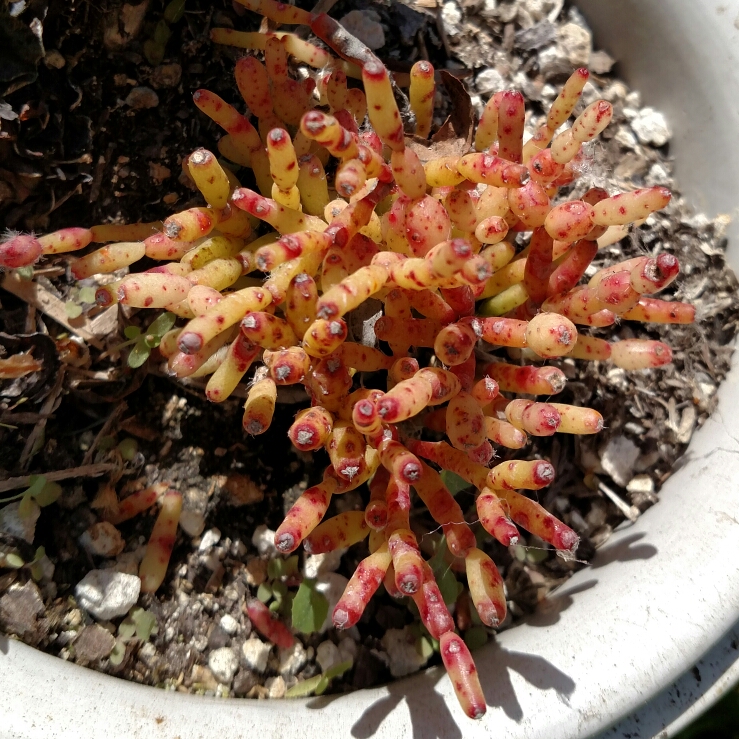
Rhipsalis cereuscula Haw syn. Erythrorhipsalis cereuscula (Haw.) ; Volgin ; Hariota cereuscula Kuntze
Coral Cactus
Rhipsalis is a genus of epiphytic cacti. They grow mostly pendent, few grow more or less upright or sprawling. They produce flowers that are small, usually about 1 cm in diameter, white or whitish in most species. Yellowish flowers occur in R. dissimilis and R. elliptica and R. hoelleri is the only Rhipsalis species with red flowers. The fruits are always berries, they are whitish or coloured pink, red or yellow. Water freely when in growth, but keep dryer in winter. Mist the leaves regularly with water to increase humidity and make sure the winter temperatures stay above 10°C. The plant is most often found indoors and may simply be mounted on a piece of bark like an orchid or potted in a good cactus mix. Rhipsalis cereuscula Haw - coral-cactus or Mistletoe Cactus - is a bushy succulent epiphyte with many tiny, cylindrical stems that are borne at the ends of long, slender branches. Stems and branches are pale green and pendent, and flowers are very small, and creamy-white.
-
Partial shade
-
Very little water
-
Not Frost hardy
-
Rich and free draining
Common name
Coral Cactus
Latin name
Rhipsalis cereuscula Haw syn. Erythrorhipsalis cereuscula (Haw.) ; Volgin ; Hariota cereuscula Kuntze
type
Epiphyte
family
Cactaceae
ph
5.0 - 7.0 Acid - Neutral
Plant & bloom calendar
-
Best time to plant
full grown dimensions
 0.60 M
0.60 M
0.60 M
0.60 M
Rhipsalis cereuscula Haw syn. Erythrorhipsalis cereuscula (Haw.) ; Volgin ; Hariota cereuscula Kuntze
Rhipsalis is a genus of epiphytic cacti. They grow mostly pendent, few grow more or less upright or sprawling. They produce flowers that are small, usually about 1 cm in diameter, white or whitish in most species. Yellowish flowers occur in R. dissimilis and R. elliptica and R. hoelleri is the only Rhipsalis species with red flowers. The fruits are always berries, they are whitish or coloured pink, red or yellow. Water freely when in growth, but keep dryer in winter. Mist the leaves regularly with water to increase humidity and make sure the winter temperatures stay above 10°C. The plant is most often found indoors and may simply be mounted on a piece of bark like an orchid or potted in a good cactus mix. Rhipsalis cereuscula Haw - coral-cactus or Mistletoe Cactus - is a bushy succulent epiphyte with many tiny, cylindrical stems that are borne at the ends of long, slender branches. Stems and branches are pale green and pendent, and flowers are very small, and creamy-white.
Planting
From Early Spring TO Mid Spring
Mistletoe cacti are easy to grow from cuttings. Take the cuttings and let the severed end callus for a few days. Plant the callused end in a cactus mix or sand that has been lightly moistened. Cuttings root in two to six weeks. Pot on young plants in an orchid or cactus mix and place in semi-shade and water when the surface of the soil is dry.
Propagation by cuttings
From Early Spring TO Late Autumn
The most common form of propagation for succulents is called vegetative propagation. This involves cuttings, where several inches of stem with leaves are cut, allowed some time to heal and after healing produce a callus. After a week or so, roots should grow. Another method is division which involves uprooting an overgrown clump and pulling the stems and roots apart. The easiest method is to allow the formation of a callus from a leaf or segment.

















